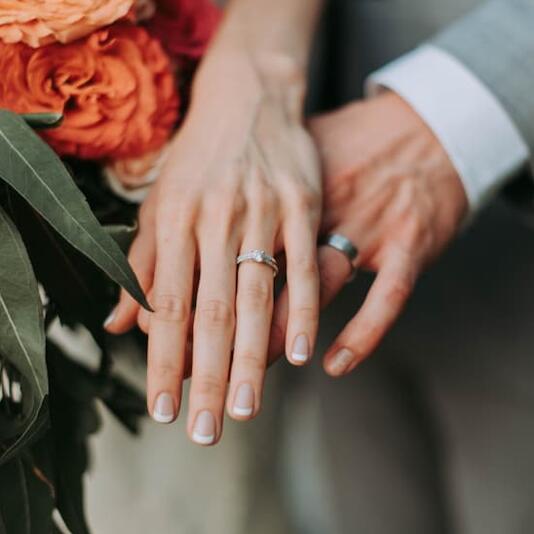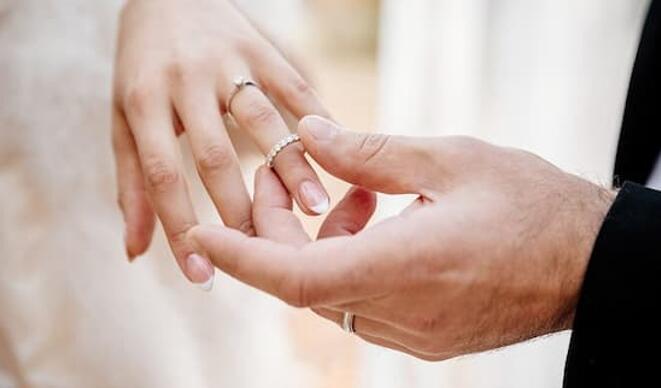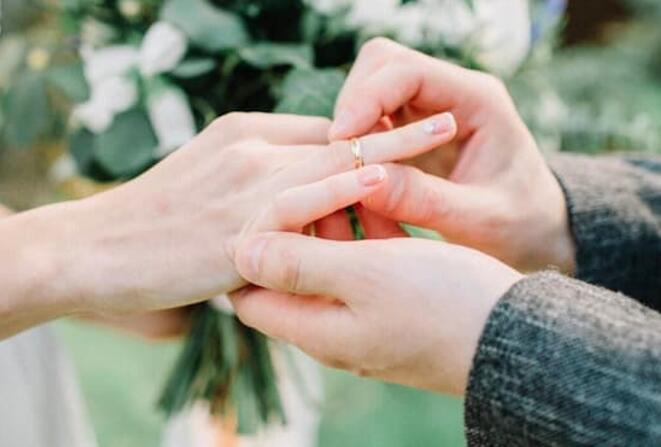From the ancient origins of the left-hand custom to the cultural variations observed around the globe, the positioning of the wedding ring holds significant meaning. This article delves into the reasons why are wedding rings worn on the left hand, explores the historical origins of this tradition, and examines the order in which they are placed on the finger and the cultural differences. Understanding these elements enhances the appreciation of this timeless symbol of love and commitment.

Before addressing the question, "Why is the wedding ring on the left hand?", it is essential to explore the profound symbolism behind wedding rings.
1. Eternal Love and Commitment
The circular shape of a wedding ring symbolizes eternity and infinite love. It has no beginning or end, reflecting the perpetual nature of a couple's commitment to each other.
2. Unity and Partnership
Wedding rings signify the union of two individuals, representing the merging of two lives into one shared journey. The exchange of rings during the wedding ceremony symbolizes mutual giving and receiving of love and trust.
3. Historical Significance
The tradition of wedding rings dates back to ancient Egypt, where rings made from reeds and hemp were exchanged as tokens of love. The ring's central opening represented a gateway to the future.
The tradition of wedding ring goes on the left hand has a rich historical background that spans various cultures and centuries. This custom is deeply rooted in symbolic beliefs, ancient practices, and evolving societal norms.
Ancient Rome
The origins of wearing wedding rings on the left hand can be traced back to ancient Rome. The Romans held a romantic belief that the fourth finger on the left hand contained the "Vena Amoris," or the "vein of love," which was thought to run directly to the heart. While this belief is anatomically incorrect, it became a widely accepted and enduring symbol of love and marital commitment. Placing the wedding ring on this particular finger was seen as a way to connect the wearer's love directly to their heart.
Medieval and Renaissance Europe
During the Medieval and Renaissance periods in Europe, the tradition of wearing wedding rings on the left hand continued to flourish. The Roman Catholic Church played a significant role in this practice. In the wedding, the priest would often touch the thumb, index, and middle fingers of the left hand while reciting the Holy Trinity ("In the name of the Father, the Son, and the Holy Spirit") before placing the ring on the fourth finger. This religious association reinforced the use of the left hand for wedding rings and embedded the custom deeply into European matrimonial practices.
Usually, wedding ring is worn on the left hand's fourth finger. The order in which you wear your wedding ring can vary based on personal preference, cultural traditions, and practical considerations. Here are some common ways to wear these rings:
Traditional Order

Modern Preferences
Many couples today choose to wear their rings in whatever order feels most comfortable and meaningful to them. This might mean wearing the engagement ring alone, stacking both rings on the same finger in a non-traditional order, or even letting the wedding ring go on the left or right hand depending on different occasion.
Wedding rings can go on left or right hand, mostly on the fourth finger. The traditions vary across different cultures:

Wedding ring customs vary significantly across different cultures, reflecting unique traditions and beliefs. In Western cultures, such as the United States and Canada, the wedding ring is typically worn on the left hand's fourth finger. This tradition stems from the ancient Roman belief. Similarly, in the United Kingdom and Ireland, the left hand's fourth finger is chosen, symbolizing a direct connection to the heart, and both rings are often worn together.
In European cultures, the practices can vary more noticeably. In Germany and Austria, the wedding ring is traditionally worn on the right hand's fourth finger. The right hand is considered more noble and truthful, symbolizing the strength and honor of the marriage. Typically, engagement rings are worn on the left hand and moved to the right hand after the wedding ceremony. In contrast, countries like France and Italy follow the left-hand tradition, similar to many Western cultures, with the engagement ring worn first and the wedding band added later. In Russia, the right hand's fourth finger is the customary choice for both engagement and wedding rings, signifying honor and trust.
Asian practices regarding wedding rings also exhibit considerable diversity. In India, the ring finger can vary between the left or right hand, depending on regional and religious customs. Some regions prefer the right hand, while others choose the left hand, and Hindu weddings may not emphasize wedding rings as much as other types of jewelry. In China, influenced by Western traditions, the wedding ring is typically worn on the left hand's fourth finger, symbolizing the closeness to the heart. Similarly, in Japan, the left hand's fourth finger is preferred, reflecting Western influence, and both engagement rings and wedding bands are worn on this finger.
In conclusion, why are wedding rings worn on the left hand? It is deeply rooted in both historical and symbolic significance. This practice originated from the ancient belief that the left hand's fourth finger contained the "vena amoris" or "vein of love," directly connected to the heart. While this belief has been scientifically debunked, the tradition persists, symbolizing love and commitment. Around the world, cultural differences highlight various interpretations of this custom, from the left hand in Western cultures to the right hand in many Eastern and European traditions. Understanding these diverse practices can help you appreciate the rich history behind this enduring symbol. So, why do you wear wedding ring on left hand or right hand? Hopefully, our article has provided some insight into the truth behind this tradition.
Yes, it's okay to wear a wedding ring on your right hand. Some people choose to wear their wedding rings on the right hand for personal, cultural, or religious reasons. The important thing is the significance and meaning it holds for the individual or couple.
Some left-handed people choose to wear their wedding ring on their right hand to avoid potential discomfort or damage while using their dominant hand. However, this is a personal choice and varies from person to person.
Yes, there is religious significance in some traditions. For example, in many Christian cultures, the left hand is chosen for wedding rings based on the belief that the vein in the fourth finger of the left hand leads directly to the heart, symbolizing love.
Learn how to shrink silicone ring with easy methods, understand the drawbacks of shrinking, and explore alternatives to achieve the perfect fit without shrinking.
Read MoreLearn how to clean tungsten ring, polish it to perfection, and ensure its longevity. Find essential care tips and common mistakes to avoid for lasting shine.
Read MoreWhat is a tungsten ring? This article introduces all the things about it, including its history, popular styles, and essential care tips. Click to read.
Read MoreLearn why cleaning nose piercing is crucial, what to use, and how to clean nose piercing safely. Get expert tips for taking care of your newly pierced nose.
Read More